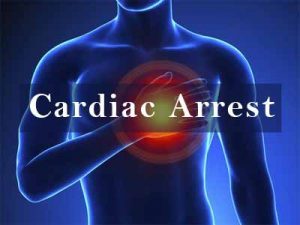- Home
- Editorial
- News
- Practice Guidelines
- Anesthesiology Guidelines
- Cancer Guidelines
- Cardiac Sciences Guidelines
- Critical Care Guidelines
- Dentistry Guidelines
- Dermatology Guidelines
- Diabetes and Endo Guidelines
- Diagnostics Guidelines
- ENT Guidelines
- Featured Practice Guidelines
- Gastroenterology Guidelines
- Geriatrics Guidelines
- Medicine Guidelines
- Nephrology Guidelines
- Neurosciences Guidelines
- Obs and Gynae Guidelines
- Ophthalmology Guidelines
- Orthopaedics Guidelines
- Paediatrics Guidelines
- Psychiatry Guidelines
- Pulmonology Guidelines
- Radiology Guidelines
- Surgery Guidelines
- Urology Guidelines
Adrenaline good for reviving cardiac arrest but has no survival benefit

A new Cochrane review has found that in patients suffering from cardiac arrest, a standard dose of adrenaline compared to placebo is effective in restarting the heart and helping them recover enough to go home from the hospital. The researchers, however, found no evidence that any of the drugs improved survival with a good neurological outcome.
Cardiac arrest results when someone's heart stops beating unexpectedly. In absence of any treatment for the condition, death can occur within minutes. Treatments that are proven to work in cardiac arrest include cardiopulmonary resuscitation and giving an electric shock (defibrillation). Drugs such as adrenaline and vasopressin are injected if these treatments do not work to try to restart the heart. Some studies have shown that while these drugs can help restart the heart initially, it may have harmful effects on the brain.
J. Finn, Curtin University, Kent Street, Bentley, Western Australia, Australia, and colleagues conducted a review of 26 studies consisting of 21,704 participants to determine whether adrenaline or vasopressin, or both, administered during cardiac arrest, afford any survival benefit.
Some studies compared adrenaline in standard doses with placebo (dummy medication); some examined standard-dose versus high-dose adrenaline; and others compared vasopressin alone or vasopressin plus adrenaline to standard doses of adrenaline.
Also Read: Emergency resuscitation device increases cardiac arrest survival rate, study reports
Key Findings:
- Moderate-quality evidence found that adrenaline increased survival to hospital discharge compared to placebo (8538 participants; an increase from 23 to 32 per 1000).
- The researchers were uncertain about survival to hospital discharge for high-dose compared to standard-dose adrenaline (participants = 6274; studies = 10; an increase from 33 to 36 per 1000); standard-dose adrenaline versus vasopressin (6 studies; 2511 participants; an increase from 72 to 90 per 1000); and standard-dose adrenaline versus vasopressin plus adrenaline (3 studies; 3242 participants; a possible decrease from 24 to 18 per 1000), due to very low-quality evidence.
- Moderate-quality evidence found that adrenaline compared with placebo increased survival to hospital admission (2 studies, 8489 participants; an increase from 83 to 209 per 1000).
- The researchers were uncertain about survival to hospital admission when comparing standard-dose with high-dose adrenaline, due to very low-quality evidence.
- Vasopressin may improve survival to hospital admission when compared with standard-dose adrenaline (3 studies, 1953 participants; low-quality evidence; an increase from 260 to 330 per 1000), and may make little or no difference when compared to standard-dose adrenaline plus vasopressin (3 studies; 3249 participants; low-quality evidence; a decrease from 218 to 207 per 1000).
- There was no evidence that adrenaline (any dose) or vasopressin improved neurological outcomes.
- The rate of return of spontaneous circulation (ROSC) was higher for standard-dose adrenaline versus placebo (participants = 8663; studies = 3); moderate-quality evidence; an increase from 115 to 329 per 1000.
- Standard-dose adrenaline may make little or no difference to ROSC when compared to standard-dose adrenaline plus vasopressin (3 studies, 3249 participants; low-quality evidence; a possible decrease from 299 to 290).
Also Read: Using adrenaline in cardiac arrest likely to cause brain damage : Landmark study
"Vasopressin compared to standard dose adrenaline improved survival to admission but not return of spontaneous circulation, whilst the combination of adrenaline and vasopressin compared with adrenaline alone had no effect on these outcomes. Neither standard dose adrenaline, high-dose adrenaline, vasopressin nor a combination of adrenaline and vasopressin improved survival with a favorable neurological outcome," concluded the authors.

Disclaimer: This site is primarily intended for healthcare professionals. Any content/information on this website does not replace the advice of medical and/or health professionals and should not be construed as medical/diagnostic advice/endorsement or prescription. Use of this site is subject to our terms of use, privacy policy, advertisement policy. © 2020 Minerva Medical Treatment Pvt Ltd